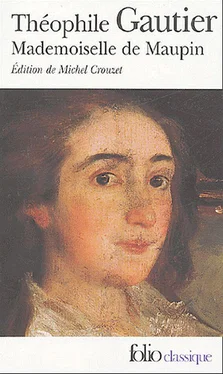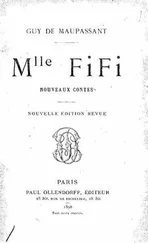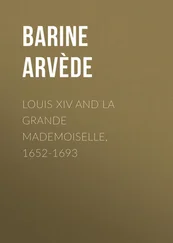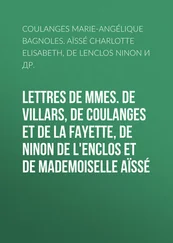Theophile Gautier - Mademoiselle de Maupin
Здесь есть возможность читать онлайн «Theophile Gautier - Mademoiselle de Maupin» весь текст электронной книги совершенно бесплатно (целиком полную версию без сокращений). В некоторых случаях можно слушать аудио, скачать через торрент в формате fb2 и присутствует краткое содержание. Жанр: Эротика, Секс, на английском языке. Описание произведения, (предисловие) а так же отзывы посетителей доступны на портале библиотеки ЛибКат.
- Название:Mademoiselle de Maupin
- Автор:
- Жанр:
- Год:неизвестен
- ISBN:нет данных
- Рейтинг книги:5 / 5. Голосов: 1
-
Избранное:Добавить в избранное
- Отзывы:
-
Ваша оценка:
- 100
- 1
- 2
- 3
- 4
- 5
Mademoiselle de Maupin: краткое содержание, описание и аннотация
Предлагаем к чтению аннотацию, описание, краткое содержание или предисловие (зависит от того, что написал сам автор книги «Mademoiselle de Maupin»). Если вы не нашли необходимую информацию о книге — напишите в комментариях, мы постараемся отыскать её.
Mademoiselle de Maupin — читать онлайн бесплатно полную книгу (весь текст) целиком
Ниже представлен текст книги, разбитый по страницам. Система сохранения места последней прочитанной страницы, позволяет с удобством читать онлайн бесплатно книгу «Mademoiselle de Maupin», без необходимости каждый раз заново искать на чём Вы остановились. Поставьте закладку, и сможете в любой момент перейти на страницу, на которой закончили чтение.
Интервал:
Закладка:
“How could a real woman, eating and drinking, getting up in the morning and going to bed at night, however adorable and full of charm she might otherwise be, compare with a creature such as this? It could not reasonably be expected, and yet it is expected and sought. What strange blindness! It is sublime or absurd. How I pity and how I admire those who pursue their dream in the teeth of all reality, and die content if they have but once kissed the lips of their chimera! But what a fearful fate is that of a Columbus who has failed to discover his world, and of a lover who has not found his mistress!
“Ah! if I were a poet my songs should be consecrated to those whose lives have been failures; whose arrows have missed the mark, who have died without speaking the word they had to utter and without pressing the hand that was destined for them; to all that has proved abortive and to all that has passed unnoticed, to the stifled fire, to the barren genius, to the. unknown pearl in the depths of the sea, to all that has loved without return, and to all that has suffered with pity from none. It would be a noble task.
“Plato was right in wishing to banish you from his republic, O ye poets! for what evil have you wrought upon us! How yet more bitter has our wormwood been rendered by your ambrosia! and how yet more arid and desolate seems our life to us after feasting our eyes on the vistas which you open up to us of the infinite! How terrible a conflict have your dreams waged against our realities, and how have our hearts been trodden and trampled on by these rude athletes during the contest!
“We have sat down like Adam at the foot of the walls of the terrestrial paradise, on the steps of the staircase leading to the world which you have created, seeing a light brighter than the sun's flashing through the chinks of the door, and hearing indistinctly some scattered notes of a seraphic harmony. Whenever one of the elect enters or comes forth amid a flood of splendor, we stretch our necks trying to see something through the half-opened portal. The fairy architecture has not its equal save in Arab tales. Piles of columns with arches superposed, pillars twisted in spirals, foliage marvellously carved, hollowed trefoils, porphyry, jaspar, lapis-lazuli-but what know I of the transparencies and dazzling reflections of the profusion of strange gems, sardonyx, chrysoberyl, aqua marina, rainbow-tinted opals, and azerodrach, with jets of crystals, torches that would make the stars grow pale, a lustrous vapor, giddy and filled with sound-a luxury perfectly Assyrian!
“The door swings to again, and you see no more. Your eyes, filled with corrosive tears, are cast down on this poor earth so impoverished and wan, on these ruined hovels and on this tattered race, on your soul, an arid rock where nothing living springs, on all the wretchedness and misfortune of reality. Ah! if only we could fly so far, if the steps of that fiery staircase did not burn our feet; but, alas I Jacob's ladder can be ascended only by angels 1
“What a fate is that of the poor man at the gate of the rich! What keen irony is that of a palace facing a cottage-the ideal fading the real, poetry facing prose! What rooted hate must wring the heart-strings of the wretched beings! What gnashings of teeth must sound through the night from their pallet, as the wind brings to their ears the sighs of theorbos and viols of love! Poets, painters, sculptors, musicians, why have you lied to us? Poets, why have you told us your dreams? Painters, why have you fixed upon the canvas that impalpable phantom which ascended and descended with your fits of passion between your heart and your head, saying to us: 'This is a woman?' Sculptors, why have you taken marble from the depths of Carrara to make it express for ever, and to the eyes of all, your most secret and fleeting desire? Musicians, why have you listened during the night to the song of the stars and the flowers, and noted it down? Why have you made songs so beautiful that the sweetest voice saying to us: 'I love you!' seems hoarse as the grinding of a saw or the croaking of a crow? Curse you for impostors! — and may fire from heaven burn up and destroy all pictures, poems, statues, and musical scores-But this is a tirade of interminable length, and one which deviates somewhat from the epistolary style. What a dose!
“I have given myself up nicely to lyrics, my dear friend, and I have now been writing bombast for some time absurdly enough. All this is very remote from our subject, which is, if I remember rightly, the glorious and triumphant history of the Chevalier D'Albert in his pursuit of the most beautiful princess in the world, as the old romances say. But in truth the history is so meagre that I am obliged to have recourse to digressions and reflections. I hope that it will not be always so, and that the romance of my life will before long be more tangled and complicated than a Spanish imbroglio.
“After wandering from street to street, I determined to go to one of my friends who was to introduce me to a house where, I was told, a world of pretty women were to be seen-a collection of real ideals, enough to satisfy a score of poets. There were some to suit every taste-aristocratic beauties with eagle looks, sea-green eyes, straight noses, proudly elevated chins, royal hands, and the walk of a goddess; silver lilies mounted on stalks of gold; simple violets of pale color and sweet perfume, with moist and downcast eye, frail neck, and diaphanous flesh; lively and piquant beauties, affected beauties, and beauties of all sorts; for the house is a very seraglio, minus the eunuchs and the kislar aga.
“My friend tells me that he has already had five or six flames there-quite as many. This seems to me prodigious in the extreme, and I greatly fear that I shall not be equally successful; De C- pretends that I shall, and that I shall succeed beyond my wishes. According to him, I have only one fault, which will be cured by time and by mixing in society; it is that I esteem woman too much and women not enough. It is quite possible that there may be some truth in this. He says that I shall be quite lovable when I have got rid of this little oddity. God grant it! Women must feel that I despise them, for a compliment which they would think adorable and charming to the last degree in the mouth of another, angers and displeases them as much as the most cutting epigram when it proceeds from mine. This has probably some connection with what De C- objects to in me.
“My heart beat a little as I ascended the staircase, and I had scarcely recovered from my emotion when De C-, nudging me with his elbow, brought me face to face with a woman of about thirty years of age, rather handsome, attired with heavy luxury and an extreme affectation of childish simplicity, which, however, did not prevent her from being plastered with red paint like a coach wheel. It was the lady of the house.
“De C-, assuming that shrill mocking voice so different from his customary tones, and which he makes use of in society when he wishes to play the charmer, said to her, with many tokens of ironic respect, through which was visible the most profound contempt:
“'This is the young fellow I spoke to you about the other day-a man of the most distinguished merit. He belongs to one of the best families, and I think that it cannot but be agreeable to you to receive him. I have therefore taken the liberty to introduce him to you.”
“'You have certainly done quite right, sir,' replied the lady, mincing in the most exaggerated fashion. Then she turned to me, and, after looking me over with the corner of her eye after the manner of a skilled connoisseur, and in a way that made me blush to the tips of my ears, said, 'You may consider yourself as invited once for all, and come as often as you have an evening to throw away.'
Читать дальшеИнтервал:
Закладка:
Похожие книги на «Mademoiselle de Maupin»
Представляем Вашему вниманию похожие книги на «Mademoiselle de Maupin» списком для выбора. Мы отобрали схожую по названию и смыслу литературу в надежде предоставить читателям больше вариантов отыскать новые, интересные, ещё непрочитанные произведения.
Обсуждение, отзывы о книге «Mademoiselle de Maupin» и просто собственные мнения читателей. Оставьте ваши комментарии, напишите, что Вы думаете о произведении, его смысле или главных героях. Укажите что конкретно понравилось, а что нет, и почему Вы так считаете.












